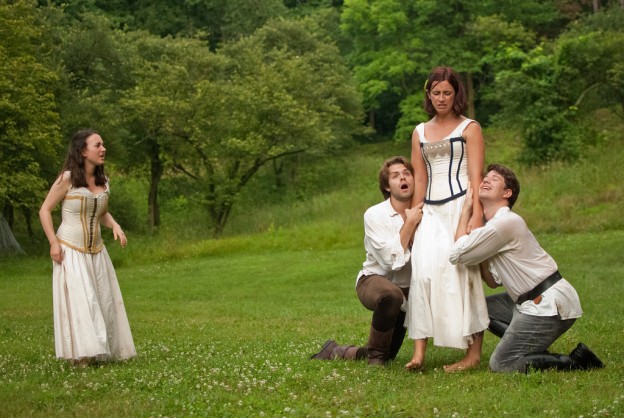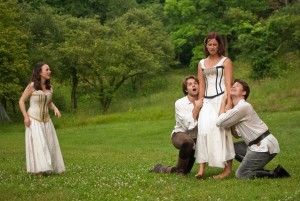In The Shakespearean Marriage (1998), Lisa Hopkins powerfully problematizes the “happy ending” of Shakespearean Comedies:
The audience is repeatedly encouraged to expect that the proceedings will be appropriately closed with a wedding—but these expectations are then either disappointed, or gratified in such a way that the spectator will be forced to question both the meaning of the events he or she has witnessed and also the assumptions underlying his or her response to the events. (17)
In A Midsummer Night’s Dream, marriage is problematic from the beginning. Theseus explains the backstory between himself and Hippolyta as:
Hippolyta, I woo’d thee with my sword,
And won thy love, doing thee injuries;
But I will wed thee in another key,
With pomp, with triumph and with revelling. (I.i.16-19)
What Theseus is describing here is really extremely unpleasant. Theseus defeated Hippolyta, Queen of the Amazons, in combat. He then took her away from her people to a foreign country where she was powerless. He explicitly states that he “won her love doing her injuries”. Given the context of their relationship, the power differential between them: he is king, she is a female war-captive, a position that was often similar to slavery. I n order for us to accept the wedding of Thesues and Hippolyta as “happy”, we need to reconfigure it in the frame of “love” or “contentment”, but Hippolyta never says anything that makes such a reading come across. When Theseus says that he cannot wait to marry Hippolyta, she says that the four days will be over soon enough (I.i.7-11). Depending on the production these lines could be delivered happily, or resignedly, but they do not necessarily call for a happy reading. They are also the last lines Hippolyta speaks until Act Four, when she reminisces about hunting with two other men, Hercules and Cadmus (IV.i.111). When we next see Hippolyta it is in Act Five, Scene One, after the marriage of Hippolyta and Theseus when she refers to him as “my Theseus” (V.i.1), and continues to banter with him flirtatiously about the play they are watching. This functions extremely well as a representation of Hopkins’ idea about gratification that raises questions. Did Hippolyta’s lack of enthusiasm about the marriage disappear in the few hours between her hunting with Theseus and her marriage to him? Does the change in Hippolyta’s character emphasize the theatricality of her role—that she has accepted her fate and is playing the character of contented wife? The very fact that we can raise these questions underline Hopkins’ point about problematic gratification. Unlike Hermia and Lysander who are in love at the beginning of the play and happily married at the end, Hippolyta has gone from seeming indifferent or cold, to seeming happy.
The other couple in the play, of course also has one partner change from being indifferent and cold to being extremely in love. I am talking, of course, about Demetrius and Helena. At the beginning of the play, Demetrius didn’t care at all for Helena. When she told him that Hermia had run away from him, he followed Hermia. When Helena stayed by his side and told him that she appreciated him and would never run away, he said that he was “sick when I do look on thee” (II.ii.212). However, when he has magic flower juice rubbed on his eyelids by Puck, he immediately changes his mind about Helena and calls her “Helena, goddess, nymph, perfect, divine!” (III.ii.138). Demetrius is the only character in the play who remains in a drugged state at the end, and the implication is that his happy ending to Helena is only possible when he is not in his right mind. Admittedly, Helena does not know this, but it still raises uncomfortable questions. What if the drug wears off? Can the audience be “happy” about a wedding where one partner is clearly not in their right mind, and their free will is denied?
In the weddings of both Theseus and Hippolyta, and Demetrius and Helena we receive the “happy endings” that as an audience we have wanted, but the way those endings are achieved raises more questions than it answers, going in perfectly in line with Hopkins’ analysis of Shakespeare’s Comedies generally.
Bibliography
Hopkins, Lisa. The Shakespearean Marriage. London: Palgrave, 1998. Print.
Shakespeare, William. A Midsummer Night’s Dream. London: Arden, 2009.


